
When we think of a dynasty, we could be picturing a Monarchy like the British Royal Family or a dictatorial regime like the Kim Dynasty in North Korea. Basically, we imagine one powerful role being confined to a single family. Passing down a role or title from one family member to the next, with nobody to challenge it or with no say from the people is the very antithesis of democracy. So much so, that countries like Indonesia, the world’s third largest democracy, have implemented laws to prevent relatives from immediately succeeding each other in public office. After all, would it not be more democratic if a single family was not allowed to monopolise its country’s political power?
That being said, there have been many instances throughout history where people with the freedom to pick their leaders, put their votes towards members of a single family. Sometimes they elect members one after the other to their countries’ top offices. Other times, they elect various family members to serve in the same administration. From the offset, it seems quite ironic that people seem to be using their freedoms to knowingly subject themselves to the rule of one family. However, a look into a few of history’s “democratic dynasties” may offer us a bit of perspective as to why certain families were chosen to lead their respective countries.
4. The Bush Family (USA)
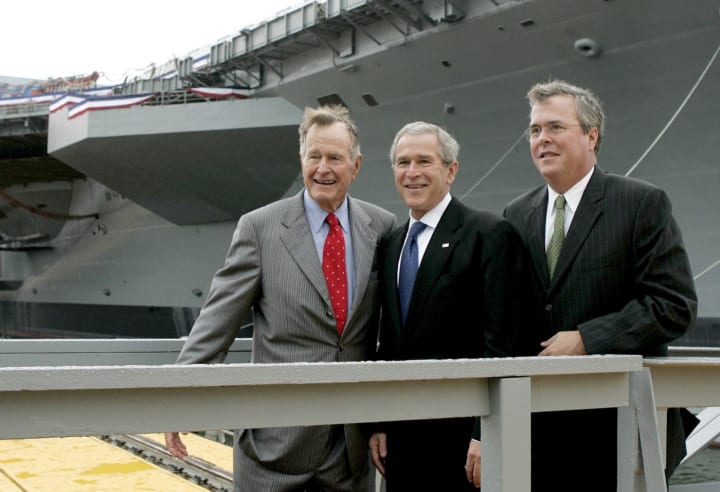
While the Kennedys may be America’s most famous political family, the Bush family is certainly the most successful. A Senatorship, two Governorships, a Vice-Presidency and two Presidencies is an incredibly impressive repertoire. What’s more impressive was that it only took four members, comprising three straight generations of the family to hold these illustrious positions.
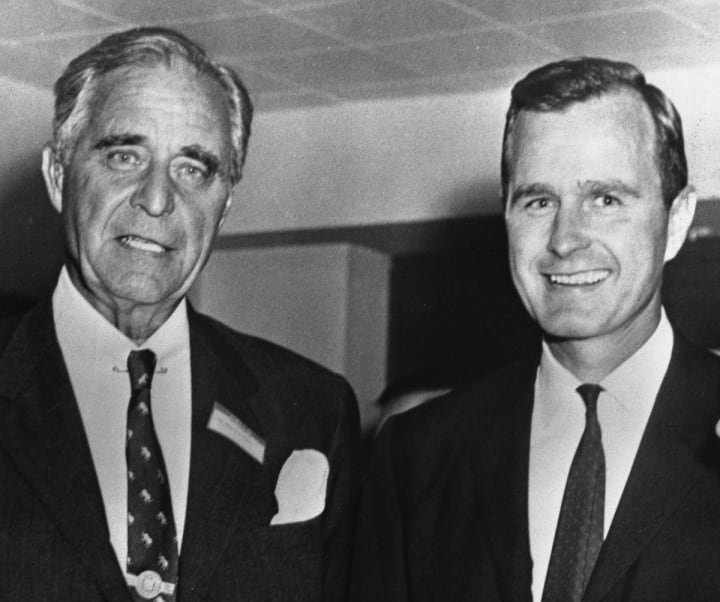
A family with an often controversial reputation to some, it can be seen that the reason why the people voted in members of the Bush family could be mainly attributed to a desire to maintain stability or the status quo. George HW Bush won the Presidency hot off the heels of the successful Reagan administration in which he served as Vice-President.
The same could be said about Jeb Bush’s ascendancy to Governor of Florida in 1999. Jeb had already beaten then Lieutenant Bob McKay in the Gubernatorial Election in 1998 but McKay still became Governor for 24 days following the death of his predecessor Lawton Chiles. Jeb’s tenure as Governor would soon overlap with his brother’s Presidency.
Speaking of which, George W. Bush’s Presidency began just around eight years following the end of his father’s tenure (the shortest gap between any related American President). Bush defeated then Vice President Al Gore in a close race and many believe that Gore’s performance was adversely affected by the Clinton Impeachment just a few years prior. In 2005, Bush won his second term with a slightly more convincing lead over John Kerry, riding on the high approval ratings he had got in the aftermath of 9/11.
This goes to show that for the most part, the Bush Family were just the right people at the right time. In many they were not voted in simply because of their relationship to one another but were in the eyes of the voters, the most suitable candidates when nobody else was better and when a better alternative came up, they were voted out or finished off their tenures just as gracefully.
3. The Nehru/Gandhi Family (India)
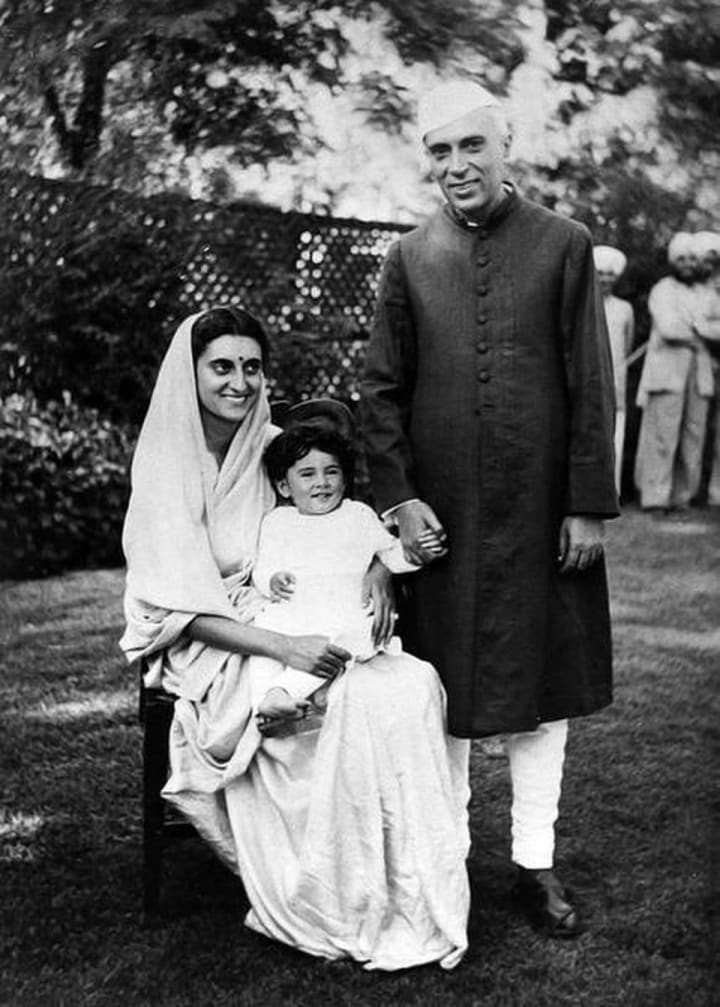
Few political dynasties are as polarising as India’s preeminent political family. With a mixture of the most passionate supporters and the most bitter detractors, their dominating victories were only matched by their devastating downfalls. Beginning with family patriarch Motial Nehru who became President of India’s National Congress Party, the family’s influence began to really take off during the time of his son.
Jawaharlal Nehru eventually succeeded his father as party president and fought hard for India’s independence. When India became an independent nation, Nehru became its first Prime Minister. To this day, Nehru is the only Indian Prime Minister to serve four consecutive terms and is the first of only two Prime Ministers to have won reelection after the conclusion of their first full term.
Nehru’s daughter Indira Gandhi soon followed in her father’s footsteps. Becoming India’s third Prime Minister and so far the only woman to hold the office, many in the Congress had hoped to make use of her background and gender to control her in order to further their own aims. Gandhi soon proved that she was no puppet. Her stubbornness and willingness to stand her ground often caused her to fall out with her own party members and her first tenure in office was marked by a great deal of instability.
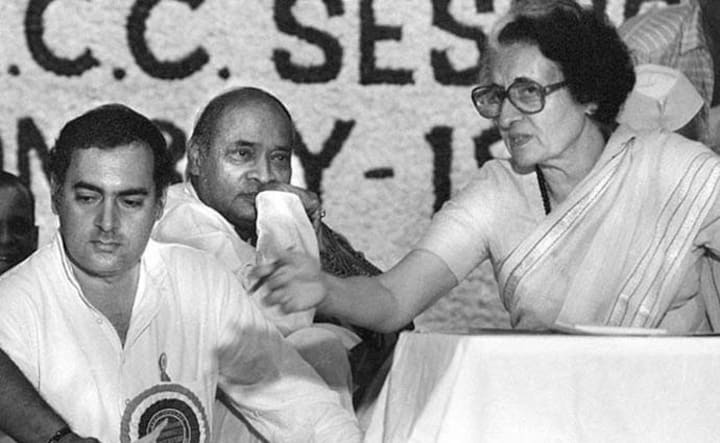
In 1975, Gandhi called for a state of emergency. Many liberties and freedoms were taken away. Gandhi’s rule grew increasingly more dictatorial with criticism of the government not being allowed and many political opponents being jailed. Among other atrocities were a forced sterilisation program initiated by Gandhi’s son Sanjay which was implemented under the guise of a family planning scheme. Gandhi was becoming increasingly unpopular but perhaps blinded by the praise she was receiving in the heavily controlled press, called for an election in 1977 to assert her position. She was decisively defeated by a united opposition.
However just three years later with democracy once again fully restored, Gandhi was voted back into office. A landslide victory, she had been able to take advantage of the ruling coalition’s inability to keep a united front following her first defeat and won back the support of many of her detractors. Like her first two terms, her third term was no less controversial. The infamous Operation Blue Star created a major rift between Gandhi and India’s significant Sikh population. This eventually culminated just three months later where Gandhi was assassinated by two of her own Sikh bodyguards. It was an unceremonious and brutal end to a turbulent but noteworthy political career.
Indira Gandhi’s death was in no way the end of her family’s political dominance over India. Just hours after her death, her son Rajiv Gandhi was sworn in as his mother’s successor. The youngest person to ever hold the Indian Prime Ministership, Rajiv was quite unlike his mother and grandfather. An airline pilot by training, he was not a politician by choice and had been thrust into the role by his mother following his brother Sanjay’s death in 1980. Despite this, he enjoyed a great deal of popularity. Following his appointment as Prime Minister, he called on India’s President to dissolve Parliament so that fair elections could be called. Rajiv won with the biggest majority in the history of India’s elections. A very impressive feat for one who was not a natural leader.
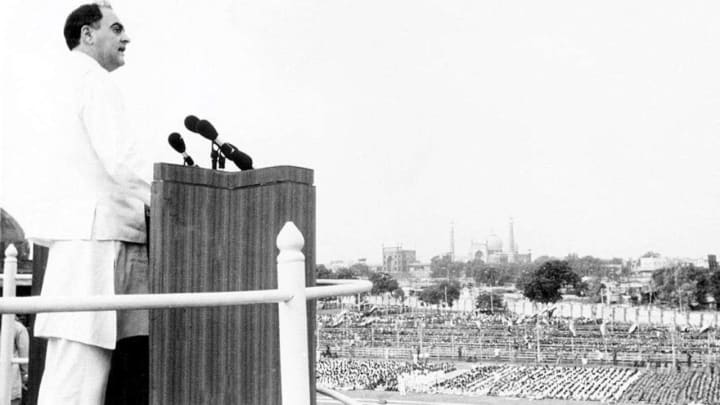
Rajiv spent the early part of his tenure re-stabilising the country. With only the past three years as an MP being his sole political experience, he had the arduous task of easing many of the tensions that arose during his mother’s time in office. While he was somewhat successful in this, the later years of his Prime Ministership were marred by allegations of political impropriety and financial scandals. Rajiv’s untainted image had been tarnished. This meant that just one term after his landslide win, Rajiv was booted out in the next election. Unlike his grandfather and mother before him, he did not live to see another term. Just under seven years after his mother’s assassination, Rajiv was killed as well in a gruesome suicide bombing while campaigning for re-election. Since then, no other member of the Nehru/Gandhi family has succeeded in claiming the Prime Minister’s office again.
Unlike most other political families, the Nehru/Gandhi clan were not as much a single unit as they were very distinct individuals who happened to be related to one another. This was their appeal. There was the beloved founding father who fought for his country’s independence, the heavy handed matriarch who sought to distance herself from her father’s shadow and the reluctant leader who was thrust into the spotlight. Regardless of people’s differing views of the family, they will always be a part of the history of modern India and continue to be part of Indian politics till this day. Although it has been over 30 years since it’s members have held the country’s top post, Rajiv’s son Rahul is the current President of the NIC, following in the footsteps of the past four generations of his family.
2. Lee Family (Singapore)
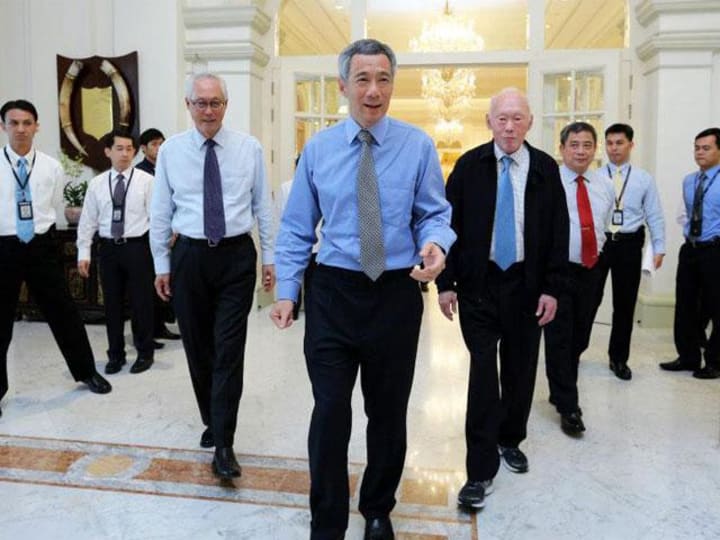
Few democratic political parties have been as dominant as Singapore’s People’s Action Party. Having been undefeated since Singapore’s independence in 1965 and with a majority of no less than 83 of the country’s 93 Parliamentary seats, many credit the PAP for Singapore’s rapid transformation from a struggling island nation to one of the world’s most prosperous economies. At the very top of Singaporean politics, is the ever present Lee family.
In its 56 years as an independent nation, Singapore has had only three Prime Ministers. All of whom have served in each other’s cabinets and two of whom are father and son. Singapore’s first Prime Minister Lee Kuan Yew, founded the PAP in the early 1950s and is credited as modern Singapore’s founding father. Faced with the arduous task of running a small country best known for being the only nation to have achieved independence against its will, Lee shattered all expectations. Under his watch, Singapore grew from a third world country into an economic powerhouse with a GDP rivalling that of the world’s most powerful countries.

Criticised as an authoritarian who micromanaged the lives of Singaporeans and who did not tolerate criticism or political satire, Lee freely admitted to ruling with an iron fist. Even his most ardent critics could not deny that his actions were instrumental to Singapore’s development. After all, the results were clear enough for the world to see. Singapore was clean, safe and prosperous while Singaporeans had been lifted out of poverty and were among the most educated people in the world. Loved by some and begrudgingly respected by others, Lee did not pander to his people, freely telling them off like a strict parent wanting the best from his children.
Regardless of how people felt about him personally, when given a choice in the elections, their vote would more often than not go to Lee and the PAP. While Singapore has had many popular and beloved figures in the opposition, at the end of the day the people knew that nobody was more capable to lead them than Lee Kuan Yew. The results spoke for themselves with landslide victories in eight straight general elections from 1959 to 1988. Lee’s resignation after 29 years as Prime Minister was by no means the end of his influence in Singapore. If anything, it was a new beginning for the Lee family’s dominance.
In the later part of Lee’s tenure, his son Lee Hsien Loong began making a name for himself in Singapore’s political scene. Winning his first parliamentary seat in 1984, the younger Lee joined his father’s cabinet in 1987 as Minister for Trade and Industries and Second Minister of Defense. After his father’s resignation, Hsien Loong climbed higher up the ranks and served as Deputy Prime Minister under his father’s successor, Goh Chok Tong. The older Lee also continued to remain in cabinet, serving as Senior Minister. Father and son had now served together in two administrations.
With this new formation, the PAP continued its success with another three dominant election victories. In 2004, Goh resigned and Hsien Loong became Singapore’s third Prime Minister, a role he has kept to this day. Just as it had been from his father’s time, all three Prime Ministers served in the same cabinet. The Senior Minister post had gone to Goh and the older Lee was appointed to the newly created position of Minister Mentor. With father and son both in high ranking cabinet positions, their commanding lead over the country they helped to build continued.
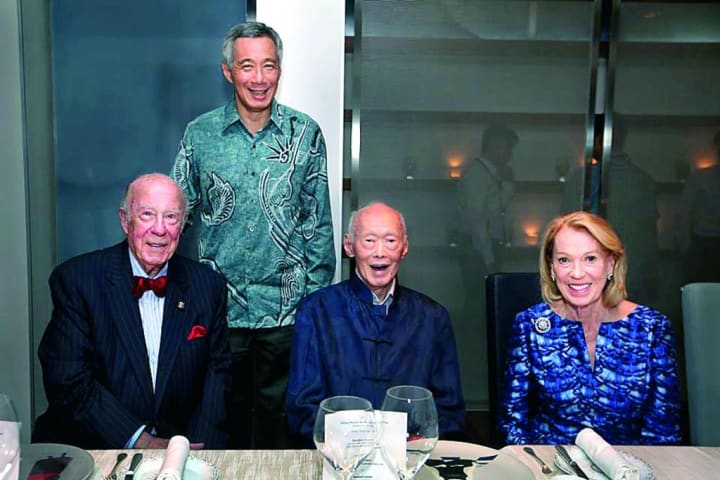
Lee Kuan Yew died in 2015 at the age of 91 after having served his country for over six decades. Singaporean’s mourned for their founding father and perhaps driven by the emotion of having lost such a constant figure in their lives, gave the PAP yet another decisive victory in that year’s general election. While Lee Hsien Loong continues to run Singapore with a successor nowhere in sight, his performance has suffered since his father’s passing. Despite retaining an extremely one sided lead, the PAP suffered its worst performance to date in Singapore’s most recent general election. On top of that, the Prime Minister is caught in a bitter family dispute between himself and his siblings over their late father’s home. Although the Lee family remains strong, it has become divided ever since it’s esteemed patriarch passed away.
Unlike the Nehru/Gandhi family or even the Bush family, Singapore’s Lee family centered very much around one member, Lee Kuan Yew. Singaporeans knew that Lee Kuan Yew was the most capable person to lead them and if they could not vote for him, their vote would go to whomever could keep Lee in a position of influence within the Singaporean government. In life, he was objectively the most qualified candidate and in death, he was a sentimental favourite and it was thanks to him that his family continues to carry the influence it does today. Regardless of Singaporean’s personal feelings towards the family, they cannot deny their contributions to the country and unless a far more capable candidate rises up, the Lee family will continue to run Singapore for a long time more to come.
1. Omar/Onn/Razak Family (Malaysia)
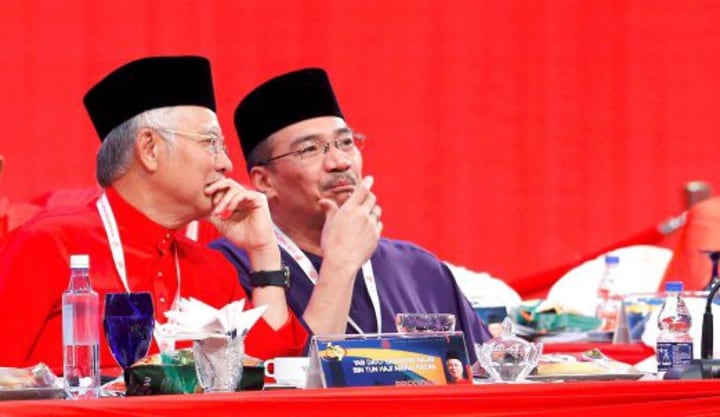
Moving on to Singapore’s neighbour Malaysia for our last entry, we are not looking at a single political bloodline but rather three families who were joined together by marriage. To briefly sum up how powerful this family has been in Malaysian politics, three of Malaysia’s nine Prime Ministers hailed from this extended clan. On top of that, a member of this family has served in the cabinet of eight of the country’s nine administrations, including the current one. From the dawn of this country’s independence till this very day, generations of Malaysians have thrown their support behind this family. A family of such stature warrants a deeper look into some of its key members.
Abdul Razak Bin Hussein was Malaysia’s first Deputy Prime Minister and later, the Second Prime Minister following the resignation of his predecessor, Tunku Abdul Rahman in 1970. Abdul Razak was also a founding member of Barisan Nasional, a political coalition that is still Malaysia’s ruling party today and was at one time considered the longest serving coalition in the free world with a 61 year reign which ended with its first defeat in 2018. In addition to this, Abdul Razak also served as Malaysia’s Defense Minister and was credited for his part in restoring stability to Malaysia following the racial riots of May 13th 1969. He was also popular among his constituents, holding his position as MP from the time the constituency was established up to his death.
Abdul Razak struggled with Leukemia even before becoming Prime Minister but kept his diagnosis a secret from the public in order to prevent a panic. Following the sudden death of his deputy and confidante Ismail Abdul Rahman, while he was out of the country, Razak was even more adamant to hide his sickness. However, he passed away in 1976 while seeking treatment for his Leukemia in London. To date, Abdul Razak is the only Malaysian Prime Minister to have died in office.
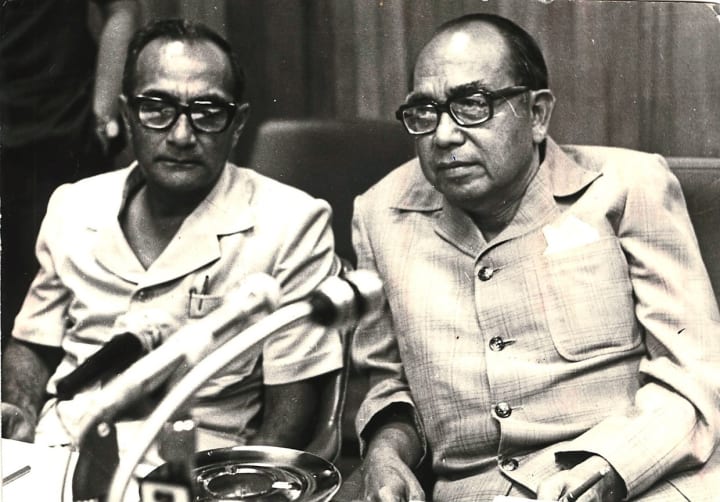
Abdul Razak was then succeeded as Prime Minister by his brother in law, Hussein Onn who had taken over as Deputy following Ismail’s death. Razak’s and Hussein’s wives were sisters and were the daughters of Noah Omar, a prominent Malaysian businessman who co-founded the Genting group and was the first Speaker of Malaysia’s Lower House of Parliament. Hussein Onn himself had come from a renowned political family. His father, Onn Jaafar was a founding member of the United Malays National Organization (UMNO) and had served as its first President. UMNO is one of Malaysia’s oldest political parties and seven out of its nine Prime Ministers including the current one, all come from this party.
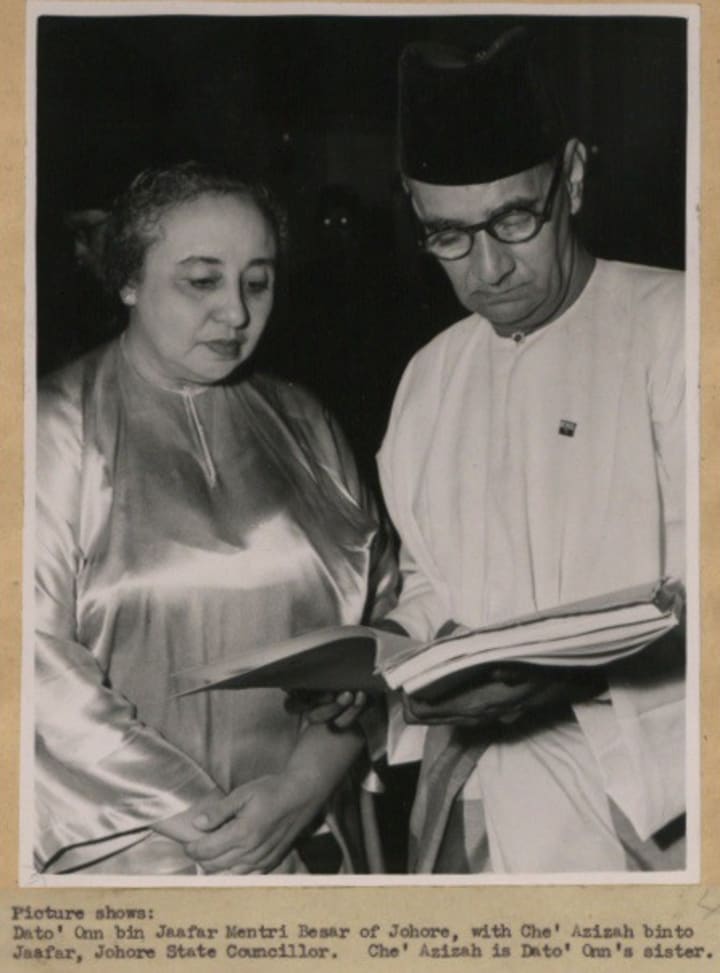
Like his father and two predecessors before him, Hussein Onn ascended to the party’s Presidency, a role which he held alongside his Prime Ministership. Dubbed Malaysia’s “Father of Unity”, Hussein Onn was most well known for promoting harmony among Malaysia’s multiracial population. However, just like his brother in law before him, health problems got in the way of his job and he ultimately resigned as Prime Minister in 1981 following heart surgery, having barely served one term. Despite his short tenure and abrupt retirement, many still look upon his time in office favourably.
With Abdul Razak dead, Hussein Onn retired and Noah Omar long removed from politics, a new generation of the family had begun to make itself known. Following Abdul Razak’s death in 1976, his 23 year old son Najib Razak was elected to his old constituency, a role he maintains to this day. At the age of 25, he was appointed to serve in his uncle’s cabinet as a Deputy Minister, becoming the youngest person in Malaysian history to do so. He set further records when he was elected as Chief Minister of the State of Pahang, once again being the youngest person to do so. Following his tenure as Chief Minister, Najib returned to cabinet and worked in many ministries in the administration of Malaysia’s fourth Prime Minister, Mahathir Mohammed. Starting as the Minister of Youth and Sports, Najib soon climbed the ranks in Mahathir’s cabinet with more senior posts as Education and Defense Minister.
Following Mahathir’s retirement in 2003, Najib ascended to the post of Deputy Prime Minister in the government of Abdullah Ahmad Badawi. When Badawi resigned in 2009, Najib became Malaysia’s sixth Prime Minister, following in the footsteps of his father and uncle before him. Although not elected to his first term, Najib won reelection to his second term in 2013. Unfortunately, his second term was far more tumultuous than his first one when Najib was implicated in the 1MDB financial scandal. This culminated in 2018 when the Barisan Nasional coalition was defeated in Malaysia’s 14th General Election. This marked the defeat of the world’s longest serving coalition and the first time a sitting Malaysian Prime Minister lost an election.

In 2020, Najib was convicted on various charges related to his financial scandal but has been allowed to continue on as an MP pending his appeal. In spite of his defeat and legal issues, Najib remains a popular figure among many Malaysians. Known to older Malaysians as the son of a beloved public figure and to the younger generation as an amiable leader who appealed to conservatives and progressives alike, Najib still commands a signifcant amount of support from Malaysians all across the board.
Another significant member of this extended political clan is Hussein Onn’s son, Hishammuddin Hussein. A successful lawyer by training, Hishamuddin is still very much in the middle of his political journey. While he has yet to reach the heights of his father, uncle, cousin and both his grandfathers, Hishammuddin has nonetheless forged a very respectable career for himself so far. Having had portfolios as Minister of Defense, Transport and Foreign Affairs among others, Hishamuddin has served in the cabinet in five of the last six Prime Ministers and as of this writing is once again Malaysia’s Defense Minister.
It goes to show that after all these years and in the face of various personal and public setbacks, this family has continued to garner enough support to remain at the forefront of Malaysian politics. By being able to appeal to traditional values like family ties and by remaining popular with the majority Malay voting base, this extended family has for generations been able to secure firm support from people of different ages, backgrounds and economic status.
Conclusion
This goes to show that sometimes, having a country run by a single family isn’t all that bad. In some instances it could even be better for a country to have such a leadership style due to the stability that comes by having leaders who follow similar styles or values. Transitioning between leaders who are related also seem to be much smoother. Even when leaders have had to resign against their people’s wishes, died suddenly or have been killed, business as usual can resume far quicker when a close relative takes over the job.
This list has also shown that political dynasties are in no way invincible nor have they made use of their family ties to illegally consolidate power. In all these instances, the people had the full right to pick their leaders and all but one of these families had a member who was democratically voted out of office at some point. Any leader in this list who came back to power also did so through fair and legitimate means. Thus, so long as the people continue to have the freedom to pick their own leaders and vote them out if they no longer perform to standard, there should be nothing wrong with them choosing to have a family run their country if they feel like it is in their best interests.
About the Creator
Isa Nan
Written accounts of life, death and everything in between






Comments
There are no comments for this story
Be the first to respond and start the conversation.